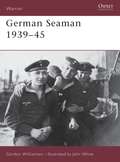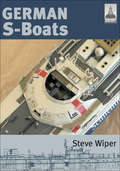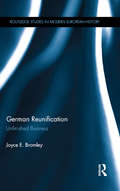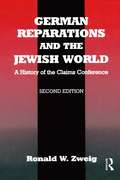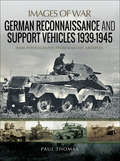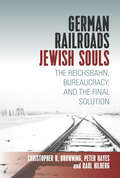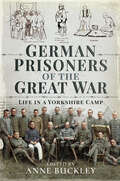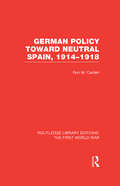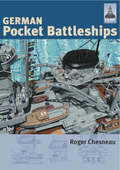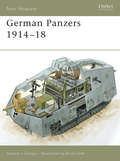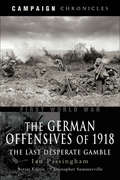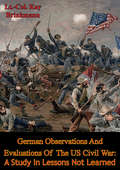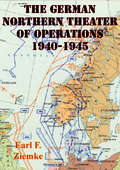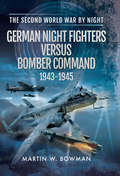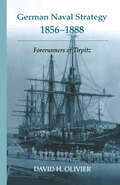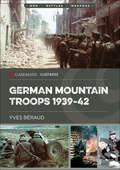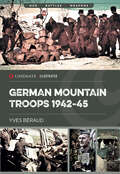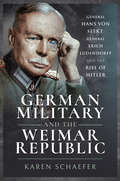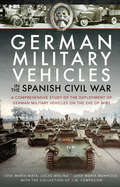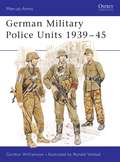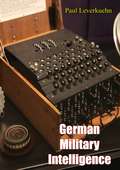- Table View
- List View
German Seaman 1939-45
by John White Gordon WilliamsonWhen re-armament came after World War I, the German Navy was forced to build anew, so the Reichsmarine and its successor, the Kriegsmarine, found itself in possession of some of the most modern, powerful and technically advanced vessels in the world. Germany was very selective in picking her sailors and the quality of manpower skill levels was thus very high. This book charts the recruitment, training, service conditions and combat experiences of a typical World War II German sailor, focusing on the main branches of the Navy, as well as the last ditch combat units thrown into action as infantry in the final days of the war.
German S-Boats in Action in the Second World War
by Hans FrankA detailed narrative of S-boat, or schnellboot, actions during World War II in all the theatres where they were deployed. The author, describes, with the help of a multitude of maps and photographs, all the incidents that these 45-knot fast attack craft were involved in. The German motor torpedo boat (German: S-boot, English: E-boat) was a controversial subject in the pre-war period of German naval rearmament. As late as 1938, the Fleet Commander recommended that S-boot building be terminated on the grounds that the craft was merely a 'weapon of opportunity' without a defined role. This outlook changed dramatically after the first wartime successes. Soon the S-boot was required on all fronts, and the area of operations. In this volume the operational deployment of the S-Boot in these theatres is given comprehensive treatment for the first time, and not purely from the isolated viewpoint of S-Boot warfare, but as an integral part of the overall military objectives of the time. This study of the effectiveness of the S-Boot, its successes and failures, is based on war diary entries and previously unseen original sources. It is a first-class account of this German naval arm in which survived to be the last class of German surface warship still carrying the offensive to the enemy.
German S-Boats (ShipCraft)
by Steve WiperThe 'ShipCraft' series provides in-depth information about building and modifying model kits of famous warship types. Lavishly illustrated, each book takes the modeller through a brief history of the subject class, highlighting differences between sister-ships and changes in their appearance over their careers. This includes paint schemes and camouflage, featuring colour profiles and highly-detailed line drawings and scale plans. The modelling section reviews the strengths and weaknesses of available kits, lists commercial accessory sets for super-detailing of the ships, and provides hints on modifying and improving the basic kit. This is followed by an extensive photographic gallery of selected high-quality models in a variety of scales, and the book concludes with a section on research references—books, monographs, large-scale plans and relevant websites. The subject of this volume is the Second World War German Navy's motor torpedo boats called Schnellboote, known to the Allies as E-Boats. One of the most effective coastal attack craft of the time, the type was built in large numbers and constantly improved as the war progressed, giving many variants to interest modellers. With its unparalleled level of visual information—paint schemes, models, line drawings and photographs—it is simply the best reference for any modelmaker setting out to build one of these famous boats.
German Reunification: Unfinished Business (Routledge Studies in Modern European History)
by Joyce E. BromleyIn 1945, German families with more than 100 hectares (247 acres) of land were forced from their homes in the eastern sector by the Soviets, now in control of that area. These families were brutally evicted from their property and had their land expropriated. In the next 45 years, the GDR government would come to control all of the agricultural land. At reunification in 1990, the earlier abuse of these farmers was compounded when the German government would not restore any of this expropriated land to these families. The German government falsely accused the Soviet Union of insisting on non-restitution as a condition of reunification. Soviet leader Mikhail Gorbachev unequivocally denies this claim and insists that land issues are a German problem to resolve. The temporary land-trust agency, established by the German government in 1990 to dispose of land it inherited from the GDR, continues to exist. After 25 years, this agency still holds almost 20 percent of this expropriated land. Its agents, most of whom were reared in GDR, decide who may (or may not) lease land, the conditions of the lease, and if and when a farmer may buy land – circumstances that remain deeply controversial. Joyce Bromley draws on extensive field research, and previously untapped sources, to explore the reliability of the government’s version of these important events. Is the German government once again, without shame, discriminating against a group of its own citizens?
German Reparations and the Jewish World: A History of the Claims Conference
by Ronald W. ZweigGerman Reparations and the Jewish World" has become a standard reference work since it was first published. Based extensively on archival sources, the author examines the difficult debate within the Jewish world whether it was possible to reach a material settlement with Germany so soon after Auschwitz. Concentrating on how the money was spent in rebuilding Jewish life, he also analyzes how the reparations payments transformed the relations bteween Israel and the diaspora, and between different Jewish political and ideological groups. This revised and expanded edition includes material on sensitive relief programmes from archives that have only recently been opened to researchers. In a new, extensive introductory essay the author reexamines the reparations, restitution and indemnification processes from the perspective of 50 years later.
German Reconnaissance and Support Vehicles, 1939–1945 (Images of War)
by Paul ThomasThis WWII pictorial history illustrates the full range of Nazi vehicles used in reconnaissance and support missions throughout the war. The German military used reconnaissance and support vehicles widely in the Second World War. This book illustrates the full range of these vehicles with authoritative information and more than 200 rare wartime photographs. Both tracked and wheeled vehicles were employed for reconnaissance and screening. These included light tanks such as the Panzer I and Panzer II, armored cars such as the six- and eight- wheeled Schwerer Panzerspähwagen, and motorcycles such as the famous BMW R75 or the Zundapp KS750. In addition to their recon role they would, on occasion, engage similar light units. Support vehicles such as the tracked Sd.Kfz.2 Kettenkrad, and the renowned Sd.Kfz.251 halftracks were used in the follow-up role, frequently with mounted grenadiers to mop up over-run enemy positions.
German Railroads, Jewish Souls: The Reichsbahn, Bureaucracy, and the Final Solution
by Christopher Browning Peter Hayes Raul Hilberg†Renowned Holocaust scholar Raul Hilberg considered the German railway system that delivered European Jews to ghettos and death camps in Eastern Europe to be not only an essential component of the “machinery of destruction” but also emblematic of the amoral bureaucracy that helped to implement the Jewish genocide. German Railroads, Jewish Souls centers around Hilberg’s seminal essay of the same name, a landmark study of German railways in the Nazi era long unavailable in English. Supplemented with additional writings from Hilberg, primary source materials, and historical commentary from leading scholars Christopher Browning and Peter Hayes, this is a rich and accessible introduction to a topic in Holocaust history that remains understudied even today.
German Prisoners of the Great War: Life in a Yorkshire Camp
by Anne BuckleyGerman POWs held in England during WWI record their experience in this volume of detailed accounts, diary entries, drawings, and more. In Munich in 1920, just after the end of the First World War, German prisoners of war in England published a book they had written and smuggled back home. Through vivid text and illustrations, they describe their experience of life in a camp at Skipton in Yorkshire. Their work, now translated into English for the first time, gives us a unique insight into their feelings about the war, their captors, and their longing to go home. In their own words they record prison camp conditions, daily routines, their relationship with the prison authorities, their activities and entertainment, and their thoughts of their homeland. The challenges and privations they faced are part of their story, as is the community they created within the confines of the camp. The whole gamut of their existence is portrayed here, in particular through their drawings and cartoons which are reproduced alongside the translation. German Prisoners of the Great War offers an inside view of a hitherto neglected aspect of the wartime experience.
German Policy Toward Neutral Spain, 1914-1918 (Routledge Library Editions: The First World War)
by Ron CardenThis volume describes and analyses the methods Germany used to reinforce Spain’s independence thereby preventing Madrid’s entry into the war on the Allied side. While there have been many studies dealing with the wartime economic histories of Holland, Switzerland, Denmark and Iceland, Spain, physically large and strategically situated has been largely ignored, with little American study of Spanish relations with the European belligerents having been done. Particular attention is paid to the forceful personality of Spanish King Alfonso XIII, who shrewdly used his special friendship with Kaiser Wilhelm II for Spanish profit: he remained a Francophile who shrewdly manipulated the Germans into thinking he favoured their side. At the same time Alfonso fended off the embrace of the Entente.
German Pocket Battleships (ShipCraft #Vol. 1)
by Roger ChesneauEverything the ship modeller needs to know about building a famous warship Numerous detailed plans and colour illustrations Focuses on very popular modelling subjects which are represented by a wide selection of kits The 'ShipCraft' series provides in-depth information about building and modifying model kits of famous warship types. Lavishly illustrated, each book takes the modeller through a brief history of the subject class, using scale plans to highlight differences between sisterships and changes in their appearance over their careers, then moves to an extensive photographic survey of either a high-quality model or a surviving example of the ship. Hints on building the model, and on modifying and improving the basic kit, are followed by a section on paint schemes and camouflage, featuring numerous colour profiles and highly-detailed line drawings. The strengths and weaknesses of available kits of the ships are reviewed, and the book concludes with a section on research references—books, monographs, large-scale plans and relevant websites. For the first volume in this series, the author has chosen the German 'pocket battleships' of WW2, the best-known of which was the Graf Spee of Battle of the River Plate fame. This innovative and infamous class of surface raiders has long been a popular subject for ship modellers, many manufacturers producing kits of the Graf Spee and the rather different Admiral Scheer and Ltzow. This book will show ship modellers how to turn their kits into something really special, but its unparalleled level of visual information will also appeal to the more general warship enthusiast. Roger Chesneau is a lifelong ship modeller and author of numerous naval books, including Ship Models in Plastic.
German Panzers 1914-18
by Steven Zaloga Brian DelfPanzer warfare is synonymous with the Wehrmacht of World War II. This book examines the story of the Panzer's more mysterious ancestors, the little-known panzers of the Great War. Germany was very slow to develop armored vehicles compared to Britain and France. Efforts to catch-up proved difficult, and only a few dozen German A7V tanks were completed in time to take part in the final campaigns of 1918. As a result, the majority of German panzer units actually used captured British tanks, the Beutepanzer. This book will trace the development of German panzers of the World War One, including the A7V and its intended but unfinished stablemates.
German Order of Battle: Panzer, Panzer Grenadier, and Waffen SS Divisions in WWII (Stackpole Military History Series)
by Samuel W MitchamThe third volume in this definitive reference on the German Army in WWII, covering the organization, combat histories, and commanders of each division. Military historian Samuel Mitcham is a noted expert in Germany&’s ground forces during the Second World War. In his three-volume German Order of Battle, he presents the most detailed and authoritative reference work on the subject to date. Mitcham&’s narrative histories highlight the organization, commanders, experiences, and casualties of each division, as well as sources for further research. Taken together, these volumes are the most comprehensive and accessible reference available on the Germany Army in World War II, unmatched in the information compiled on each division from inception to destruction. Volume Three covers the Panzer, Panzer Grenadier, and Waffen SS Divisions.
German Offensives of 1918: The Last Desperate Gamble (Campaign Chronicles)
by Ian PassinghamHe boldly reassesses German military doctrine, the strategic thinking behind the offensives and the effectiveness of the storm troop tactics used. He also considers how the poor state of German military morale and the privations and unrest of the German people contributed to the army's defeat.
German Observations And Evaluations Of The US Civil War: A Study In Lessons Not Learned
by Lt.-Col. Kay BrinkmannHelmuth von Moltke's alleged statement the U.S. Civil War was an affair in which two armed mobs chased each other around the country and from which no lessons could be learned underlines a grave misjudgment of this war in contemporary Germany. Today, however, the American Civil War is recognized as the first modem war. It produced a number of lessons across the strategic operational and tactical levels that shaped the face of war. But the German observers failed to draw significant conclusions at the time. A wide variety of reasons inhibited a thorough and unbiased analysis.This study aims to analyze the German observations and to arrive at the causes that led to the underestimation and disregard of the lessons from the Civil War. The thesis provides a sketch of the Civil War and the situation of contemporary Germany. It then examines the German observers and their evaluations. Thereafter, the author reflects selected essential lessons of the war against the contemporary German military evolution. In a final step the conclusions of these sections will merge into an analysis of the causes, which prevented the German army from arriving at the lessons of the U.S. Civil War.
German Northern Theater of Operations 1940-1945 [Illustrated Edition]
by Earl Ziemke[Includes 23 maps and 31 illustrations]This volume describes two campaigns that the Germans conducted in their Northern Theater of Operations. The first they launched, on 9 April 1940, against Denmark and Norway. The second they conducted out of Finland in partnership with the Finns against the Soviet Union. The latter campaign began on 22 June 1941 and ended in the winter of 1944-45 after the Finnish Government had sued for peace.The scene of these campaigns by the end of 1941 stretched from the North Sea to the Arctic Ocean and from Bergen on the west coast of Norway, to Petrozavodsk, the former capital of the Karelo-Finnish Soviet Socialist Republic. It faced east into the Soviet Union on a 700-mile-long front, and west on a 1,300-mile sea frontier. Hitler regarded this theater as the keystone of his empire, and, after 1941, maintained in it two armies totaling over a half million men.In spite of its vast area and the effort and worry which Hitler lavished on it, the Northern Theater throughout most of the war constituted something of a military backwater. The major operations which took place in the theater were overshadowed by events on other fronts, and public attention focused on the theaters in which the strategically decisive operations were expected to take place. Remoteness, German security measures, and the Russians' well-known penchant for secrecy combined to keep information concerning the Northern Theater down to a mere trickle, much of that inaccurate. Since the war, through official and private publications, a great deal more has become known. The present volume is based in the main on the greatest remaining source of unexploited information, the captured German military and naval records. In addition a number of the participants on the German side have very generously contributed from their personal knowledge and experience.
German Night Fighters Versus Bomber Command, 1943–1945 (The Second World War By Night)
by Martin W. BowmanThis new volume from Martin Bowman examines the closing years of the Second World War, as the tide turned against the German and Axis forces. It includes riveting first-hand accounts from German fighter pilots caught up in some of the most dramatic night time conflicts of the latter war years.Viewing Bomber Command's operations through the eyes of the enemy, the reader is offered a fresh and intriguing perspective. Set in context by Bowman's historical narrative, these snippets of pilot testimony work to offer an authentic sense of the times at hand.
German Naval Strategy, 1856-1888: Forerunners to Tirpitz
by David H. OlivierThis book is a comparative study of the evolution of the German navy in the second half of the nineteenth century. It examines the development of strategy, especially commerce-raiding, in comparison to what other navies were doing in this era of rapid technological change. It is not an insular history, merely listing ship rosters or specific events
German Naval Camouflage, 1942–1945: 1942 - 1945
by John Asmussen Eric LeonSecond in &“the most complete and authoritative set of books ever written on the color schemes used by the Kriegsmarine throughout World War II&” (Great Models). This book completes a highly original and superbly illustrated two-volume survey of German naval camouflage and markings in the Nazi era. On first publication in 2012, the 1939-1941 volume was quickly recognized by warship enthusiasts and modelmakers as a major step forward in the understanding of a complex and much debated topic. It is already considered the standard reference, and this second volume is keenly awaited. Although a few crucial documents have recently come to light, this study is largely based on close scrutiny of all available photos, including many newly discovered, collated with the first-hand testimony of Kriegsmarine survivors. After decades of study, the authors are probably the world&’s leading experts, and their work challenges many accepted views, while greatly expanding the general understanding of the subject. The fruits of their labors are presented in the form of exquisite color illustrations of every scheme and variation for which evidence is available. This volume covers all major surviving ships down to destroyers from 1942 to the end of the war, and adds a new section on torpedo boats. While there can never be a last word on such an elusive and poorly documented subject, these two volumes will remain the most authoritative work in the field for many years to come.&“Impressive, wonderful and indispensable for both historians and modelers or naval wargamers.&” —Miniaturas JM
German Mountain Troops, 1939–42 (Casemate Illustrated #20)
by Yves BéraudA pictorial history of the Nazi military’s elite Gebirgstruppen during World War II.Fifteen elite mountain divisions and a multitude of small units fought for the Wehrmacht during World War II. They fought on all fronts, operating in hostile environments ranging from the far north to Libya, the Atlantic to the Caucasus—serving in all the “hot spots.” This book, the culmination of some four decades of research and the support of many veterans and collectors, describes the life, operations and equipment of these specialist units.“A very illuminating study on some of WWII Germany’s finest combat troops in their most successful actions of the early war period.” —AMPS“Supported by a great collection of colour and monochrome photographs - one with the men wearing patterned tablecloths to stave off the cold in Norway is my favourite. . . . It will appeal to readers interested in the German army in the early phases of World War II.” —Wargames Illustrated
German Mountain Troops 1942–45 (Casemate Illustrated)
by Yves Béraud"The author does a terrific job of outlining the many campaigns and areas where the German Mountain troops fought throughout the war, and the unique challenges that some of these areas brought." — AMPSWhen World War II began, the Wehrmacht had fifteen mountain divisions and a multitude of small units, including some Austrian units that had been incorporated into the German army after the Anschluss. These mountain units would operate in hostile environments on all fronts during World War II. Due to their training, equipment and adaptability, the Gebirgstruppen would be deployed to fight in almost every theater. In the last years of the war they would see action in North Africa, Italy, the Balkans, Norway and Finland, and in the West as the Allies pushed German forces back toward Berlin. This book, the culmination of four decades of research and the support of many veterans and collectors, describes the uniform, equipment, and operations of these specialist units during the later years of World War II. The text is complemented by period photographs taken at the front, including many color photographs, and modern photographs of uniform details.
German Mountain & Ski Troops 1939-45
by Gordon Williamson Stephen AndrewOsprey's study of Germany's mountain and ski troops of World War II (1939-1945). Fighting in every theatre from the burning sands of North Africa to the icy wastes above the arctic circle the German Army's Gebirgstruppen troops were some of the most effective in the whole of the Wehrmacht. Their esprit de corps and morale were extremely high and their commanders, men such as Eduard Dietl, the 'Hero of Narvik', and Julius 'Papa' Ringel, were idolised by their men. Dietl himself was the first soldier of the Wehrmacht to be awarded the coveted Oakleaves to the Knights Cross of the Iron Cross. In this book Gordon Williamson details the uniforms, organisation and combat histories of these elite troops.
German Military and the Weimar Republic: General Hans Von Seekt, General Erich Ludendorff And The Rise Of Hitler
by Karen SchaeferThis military biography examines the man who sought to rebuild the Germany Army after WWI—and the rival who stoked the rise of Nazism.After Germany’s devastating defeat in the First World War, General Hans von Seekt became Chief of the Army Command at the Reichewehr Ministry of the Weimar Republic. His job was to rebuild the shattered German army and repair the nation’s standing on the world stage. The punitive terms of the post-war settlement made these ambitious goals nearly impossible, but the most significant challenges von Seekt faced came from within Germany.Von Seekt aimed to build a modern and efficient military with a main strategy of peaceful defense purposes. This original and far-sighted policy was opposed by his rival, General Erich Ludendorff, who led a nationalistic movement seeking revenge for Germany’s defeat. Ludendorff proposed to rebuild the once-mighty German imperial army as a major international force. The failure of von Seekt's experiment was tragically mirrored by the fall of the Weimar Republic, and the rise of rise of Hitler and Nazi Germany.
German Military Vehicles in the Spanish Civil War: A Comprehensive Study of the Deployment of German Military Vehicles on the Eve of WW2
by Jose María Mata Lucas Molina José María ManriqueAn authoritative and fully illustrated study of the German military vehicles that fought in the Spanish Civil War—from motorcycles to Panzer Tanks. This comprehensive volume examines the combat and logistics vehicles that formed a vital part of the German contingent fighting in the Spanish Civil War alongside Francisco Franco’s Nationalist forces. The Panzer I, which so surprised the world in the Polish campaign of World War II, was first seen in the Spanish Civil War. It appeared together with a wide range of war materiel such as antitank guns, flamethrowers, and other armaments.This book covers a wide range of vehicles, each identified in detail: from the humblest motorcycle to the Horch staff car; from Opel ‘Blitz’, MAN Diesel, Mercedes, and Krupp trucks to the enormous Vomag 3LR 443 truck; as well as the many types of military ambulances seen in Spain during the war years. With more than 500 historic images—most of them previously unpublished—this volume is an unprecedented study of the vehicles used by the German contingent in the Spanish Civil War.
German Military Police Units 1939-45
by Ronald Volstad Gordon WilliamsonThe military policeman must be one of the least appreciated yet most indispensable military figures in modern history. In the mobile warfare of the 20th century no army could keep its vital supply routes open without the military policeman. This book documents the organisation, uniforms and insignia of the many and varied German military police units of World War II. Their duties included traffic control; maintaining military order and discipline; collection and escorting prisoners of war; prevention of looting; disarming civilians; checking captured enemy soldiers for documents; collection of fallen enemy propaganda leaflets and providing street patrols in occupied areas.
German Military Intelligence
by R. H. Stevens Paul LeverkuehnSeldom can the true history of a secret service be revealed but the total collapse of Nazi Germany provided the opportunity and Dr. Paul Leverkuehn has taken it. He was himself a senior member of the Abwehr, Germany's Military Intelligence Service, and one of Admiral Canaris's trusted collaborators. He has sought out some of the most important survivors of the Abwehr, and in this book we have their stories as well as his own. During the war the author was chief of German espionage in Turkey and the Near East and he describes the elaborate intrigues with the Mufti of Jerusalem and Rashid Ali, the Iraqi Prime Minister, whom he smuggled out of Turkey disguised as a German journalist. He tells many other fascinating stories of the Abwehr: that of the man who sailed an agent 14,000 miles to operate against the British in South Africa; of the men who organized the 'Brandenburg Commandos' who operated far behind the Russian lines in enemy uniform; of the mysterious Klatt, who claimed to be in contact with a radio operator inside the Kremlin; of the unmasking of the great Soviet spy organization the Rote Kapelle, which functioned inside the German Air Ministry. He also throws interesting light on the German's use of nationalist minorities; the intrigues with the Flemish nationalists in Belgium; the negotiations with the I.R.A. in Ireland; and the recruitment of Ukrainians against Russia. This book is the first authoritative account of the German Military Service and in important contribution to the history of the Second World War. Print ed.
